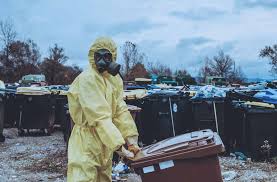Strategies for Effective Pharmaceutical Waste Disposal
Pharmaceutical Waste Disposal is all about getting rid of unused or expired medicines and other medical products safely. When people no longer need their medications or medical supplies, it’s essential to dispose of them properly to avoid harm to people, animals, and the environment.
Pharmaceutical waste includes things like expired pills, leftover liquid medications, used syringes, and even medical equipment. These items can be dangerous if not handled correctly. For example, throwing medicines in the trash or flushing them down the toilet can lead to contamination of water sources or accidental ingestion by people or animals.
To dispose of pharmaceutical waste safely, there are special guidelines and procedures to follow. Many communities have drop-off locations where people can bring their unused medications for proper disposal. These locations are often found in pharmacies, hospitals, or community centers.
Some medications come with specific instructions for disposal. For example, some pills can be mixed with kitty litter or coffee grounds before throwing them in the trash to help prevent accidental ingestion. Liquid medications may need to be mixed with something else, like dirt or cat litter, to make them less appealing to animals.
Unused syringes and other medical sharps should be disposed of in puncture-resistant containers. These containers are designed to prevent accidental needle sticks and can be dropped off at designated locations for safe disposal.
Proper pharmaceutical waste disposal is essential for protecting the environment. Medications and medical supplies can contain chemicals that are harmful to plants, animals, and ecosystems. By disposing of them correctly, we can reduce the risk of contamination and keep our environment clean and healthy.
Public education is crucial when it comes to pharmaceutical waste disposal. Many people may not be aware of the potential dangers associated with improper disposal methods. By providing information and resources, communities can help individuals make informed decisions about how to dispose of their pharmaceutical waste safely.
Pharmaceutical waste disposal is an important aspect of healthcare and environmental stewardship. By following proper guidelines and procedures, we can ensure that unused medications and medical supplies are disposed of safely and responsibly. This helps protect people, animals, and the environment from harm. So, let’s work together to raise awareness and promote safe pharmaceutical waste disposal practices for a healthier world.
Healthcare facilities, pharmaceutical manufacturers, and other stakeholders need to adopt effective strategies for managing and disposing of pharmaceutical waste safely and responsibly. This article discusses strategies for effective pharmaceutical waste disposal.
Read Also: 10 Reasons Why Food Workers Should Keep Garbage Cans Clean and Free of Buildup
The Importance of Proper Pharmaceutical Waste Disposal

Pharmaceutical waste includes expired drugs, contaminated materials, and other substances that are no longer needed or are unusable. Improper disposal of pharmaceutical waste can lead to various issues, including:
1. Environmental Pollution: Pharmaceutical waste can contain hazardous chemicals that, when released into the environment, can contaminate water sources, soil, and air. This pollution can harm wildlife, aquatic life, and plant ecosystems.
2. Health Risks: The improper disposal of pharmaceutical waste can lead to accidental exposure to potentially harmful substances. Healthcare workers, waste management personnel, and even the general public can be at risk.
3. Regulatory Compliance: Non-compliance with regulations governing pharmaceutical waste disposal can result in fines and legal liabilities for healthcare facilities and pharmaceutical manufacturers.
Given these risks and concerns, it is imperative to implement effective strategies for pharmaceutical waste disposal.
Segregation and Classification of Pharmaceutical Waste
Before disposal, it is crucial to segregate and classify pharmaceutical waste appropriately. This involves sorting waste into categories based on its characteristics and potential hazards. Common categories of pharmaceutical waste include:
1. Hazardous Waste: Pharmaceutical products that are deemed hazardous due to their toxic, flammable, or reactive properties fall into this category. Examples include chemotherapy drugs, some antibiotics, and certain solvents.
2. Non-Hazardous Waste: This category encompasses non-hazardous pharmaceutical waste that is not classified as hazardous. This can include expired over-the-counter medications, empty containers, and non-hazardous chemicals.
3. Controlled Substances: Drugs with a high potential for abuse or addiction are considered controlled substances. Proper disposal is essential to prevent diversion and misuse.
4. Expired Medications: Expired medications that are no longer safe for use should be collected separately for disposal.
Segregating pharmaceutical waste allows for targeted disposal methods that minimize environmental impact and reduce the risk of exposure to hazardous materials.
Compliance With Regulations

To ensure pharmaceutical waste is disposed of properly, healthcare facilities and pharmaceutical manufacturers must adhere to federal, state, and local regulations.
Regulations are in place to protect public health and the environment by providing guidelines for safe disposal practices. Key regulations that need to be followed include:
1. Resource Conservation and Recovery Act (RCRA): The RCRA provides a framework for managing hazardous waste, including pharmaceutical waste. It outlines requirements for proper storage, transportation, and disposal of hazardous waste.
2. Drug Enforcement Administration (DEA) Regulations: The DEA regulates the disposal of controlled substances, including prescription medications and other pharmaceuticals with the potential for abuse. Compliance with DEA regulations is essential to prevent diversion and misuse of these drugs.
3. Environmental Protection Agency (EPA) Guidelines: The EPA guides the disposal of pharmaceutical waste and hazardous waste. Compliance with EPA guidelines helps prevent environmental pollution and safeguards public health.
4. State and Local Regulations: In addition to federal regulations, state and local governments may have specific requirements for pharmaceutical waste disposal. Healthcare facilities and pharmaceutical manufacturers should be aware of and comply with these regulations.
By staying informed and compliant with these regulations, organizations can avoid legal complications and ensure responsible pharmaceutical waste disposal.
Read Also: Everything You Need to Know About Trash Pickup in Columbus, Ohio
Implementing Safe Storage Practices
Proper storage of pharmaceutical waste is a fundamental component of effective waste management. Pharmaceutical waste should be stored in a manner that prevents contamination and minimizes the risk of accidental exposure. Some key storage practices include:
1. Secure Containers: Use containers that are designed for pharmaceutical waste storage. These containers should be leak-proof and labeled clearly to indicate the type of waste they hold.
2. Segregation: Keep different categories of pharmaceutical waste separated to prevent cross-contamination. Hazardous waste should not be stored with non-hazardous waste.
3. Access Control: Limit access to pharmaceutical waste storage areas to authorized personnel only. This helps prevent unauthorized individuals from coming into contact with hazardous materials.
4. Emergency Response: Have appropriate emergency response measures in place, such as spill kits and safety equipment, in case of accidents or spills.
Developing a Comprehensive Disposal Plan

A well-thought-out disposal plan is essential to ensure pharmaceutical waste is disposed of safely and efficiently. Key elements of a comprehensive disposal plan include:
1. Waste Disposal Contracts: Establish contracts with licensed waste disposal companies that specialize in pharmaceutical waste. These companies have the expertise and equipment to handle pharmaceutical waste safely.
2. Training and Education: Ensure that all staff members involved in pharmaceutical waste management receive proper training and education. This includes understanding the different categories of waste, how to handle waste safely, and compliance with regulations.
3. Documentation: Maintain accurate records of all pharmaceutical waste generated and disposed of, including manifests, certificates of disposal, and any other required documentation.
4. Regular Audits and Inspections: Conduct regular audits and inspections of pharmaceutical waste management practices to identify any areas that need improvement and ensure compliance with regulations.
Promoting Sustainability

In addition to the safety and regulatory aspects of pharmaceutical waste disposal, promoting sustainability is an important consideration.
Sustainable disposal practices aim to minimize the environmental impact of waste disposal. Some strategies for promoting sustainability in pharmaceutical waste disposal include:
1. Recycling: Explore opportunities to recycle or repurpose certain pharmaceutical waste materials, such as glass containers or plastic packaging. Recycling reduces the overall waste generated.
2. Reduction of Packaging Waste: Work with pharmaceutical manufacturers to reduce excessive packaging, which can lead to unnecessary waste. Smaller packaging and reduced use of plastics can have a positive environmental impact.
3. Energy Recovery: Consider waste-to-energy technologies that can convert certain pharmaceutical waste into useful energy, reducing the carbon footprint of disposal.
4. Eco-Friendly Packaging: Encourage the use of eco-friendly and biodegradable packaging materials for pharmaceutical products.
5. Green Initiatives: Embrace sustainability as part of the organization’s culture and promote green initiatives that extend to pharmaceutical waste management.
Generally, The proper disposal of pharmaceutical waste is an essential aspect of healthcare and environmental stewardship
By implementing effective strategies, including appropriate segregation and classification, regulatory compliance, safe storage, comprehensive disposal plans, sustainability practices, and a strong sense of accountability, stakeholders can minimize the environmental impact and health risks associated with pharmaceutical waste.
Responsible pharmaceutical waste disposal not only protects public health and the environment but also ensures compliance with regulations and fosters a culture of sustainability within the healthcare and pharmaceutical industries.
Read Also: Recommended Hazardous Waste Disposal Practices


